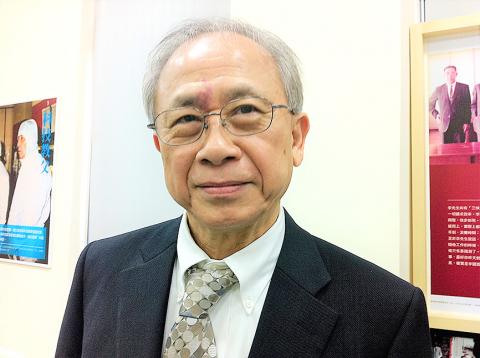Chung-Hua Institution for Economic Research (CIER, 中華經濟研究院) yesterday announced that its chairman, Hu Sheng-cheng (胡勝正), had died of pulmonary calcification on Tuesday evening at National Taiwan University Hospital.
The 77-year-old widely respected academic was survived by his wife and two sons.
Hu had been frail and was recently hospitalized for flu symptoms, his secretary said by telephone.

Photo: Wang Meng-lun, Taipei Times
The Taipei-based think tank is setting up a makeshift memorial hall for people to pay tribute to Hu from today, she said.
With a doctoral degree in economics from the University of Rochester in the US, Hu took the helm of CIER in 2016 at the invitation of President Tsai Ing-wen (蔡英文). He concurrently served as a standing board director at the central bank.
Tsai said Hu’s death was a great loss to the nation.
A native of Yilan, Hu taught at Purdue University for 28 years before returning home to teach at National Taiwan University in 1996. In 2000 he was elected a member of Academia Sinica, the nation’s top research institute.
Hu joined the government in 2001, first serving as minister without portfolio and later heading the Council for Economic Planning and Development (renamed the National Development Council, NDC) and the Financial Supervisory Commission.
Hu had called on the local industry to transform and upgrade, replacing the “Made in Taiwan” model with the “Served by Taiwan” orientation, the NDC said in a statement.
Hu also pushed for equitable distribution of the nation’s wealth and resources, as well as advocated the need for balanced development between rural and urban areas, the council said.
The central bank described Hu as a gentle man, who remained positive even as his health deteriorated after a serious gastrointestinal ailment in 2016.
He passed out during a meeting at the Presidential Office in April last year and was rushed to Mackay Memorial Hospital.
Academics across the political spectrum mourned his death, expressing their admiration for his academic prowess.
Hu gave up a comfortable life in the US and demonstrated great courage by joining the government in a time of tumult, Taiwan Institute of Economic Research (台經院) president Lin Chien-fu (林建甫) said.
As the head of CIER, Hu said the institute would strive for better quality and forward-looking research to help the government, industry and society.
He showed particular concern about the nation’s rapidly aging population, which he said merited serious attention from policymakers and the public so that they could better grasp the issue and make adjustments.

Sweeping policy changes under US Secretary of Health and Human Services Robert F. Kennedy Jr are having a chilling effect on vaccine makers as anti-vaccine rhetoric has turned into concrete changes in inoculation schedules and recommendations, investors and executives said. The administration of US President Donald Trump has in the past year upended vaccine recommendations, with the country last month ending its longstanding guidance that all children receive inoculations against flu, hepatitis A and other diseases. The unprecedented changes have led to diminished vaccine usage, hurt the investment case for some biotechs, and created a drag that would likely dent revenues and

Global semiconductor stocks advanced yesterday, as comments by Nvidia Corp chief executive officer Jensen Huang (黃仁勳) at Davos, Switzerland, helped reinforce investor enthusiasm for artificial intelligence (AI). Samsung Electronics Co gained as much as 5 percent to an all-time high, helping drive South Korea’s benchmark KOSPI above 5,000 for the first time. That came after the Philadelphia Semiconductor Index rose more than 3 percent to a fresh record on Wednesday, with a boost from Nvidia. The gains came amid broad risk-on trade after US President Donald Trump withdrew his threat of tariffs on some European nations over backing for Greenland. Huang further

CULPRITS: Factors that affected the slip included falling global crude oil prices, wait-and-see consumer attitudes due to US tariffs and a different Lunar New Year holiday schedule Taiwan’s retail sales ended a nine-year growth streak last year, slipping 0.2 percent from a year earlier as uncertainty over US tariff policies affected demand for durable goods, data released on Friday by the Ministry of Economic Affairs showed. Last year’s retail sales totaled NT$4.84 trillion (US$153.27 billion), down about NT$9.5 billion, or 0.2 percent, from 2024. Despite the decline, the figure was still the second-highest annual sales total on record. Ministry statistics department deputy head Chen Yu-fang (陳玉芳) said sales of cars, motorcycles and related products, which accounted for 17.4 percent of total retail rales last year, fell NT$68.1 billion, or

HSBC Bank Taiwan Ltd (匯豐台灣商銀) and the Taiwan High Prosecutors Office recently signed a memorandum of understanding (MOU) to enhance cooperation on the suspicious transaction analysis mechanism. This landmark agreement makes HSBC the first foreign bank in Taiwan to establish such a partnership with the High Prosecutors Office, underscoring its commitment to active anti-fraud initiatives, financial inclusion, and the “Treating Customers Fairly” principle. Through this deep public-private collaboration, both parties aim to co-create a secure financial ecosystem via early warning detection and precise fraud prevention technologies. At the signing ceremony, HSBC Taiwan CEO and head of banking Adam Chen (陳志堅)